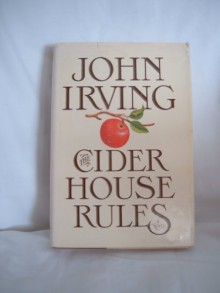
Oof. This is gonna be a tough one to review.
First, it should be known that I was not looking forward to this book. Nothing about it called to me. Nothing about the film adaptation ever made me want to watch the movie, either. (Let it be known that I still have no interest in watching the movie.) And if it weren't for this John Irving Challenge I'm doing, where I'm trying to read all of his novels in a year's time, I likely never would have picked this up. Do I regret reading it? Yes and no. Let's discuss, shall we?
I hated the first chapter and a half of The Cider House Rules. I've come to expect that I'm gonna be pretty confused for the first fifty to a hundred pages of an Irving novel. Usually the stuff at the beginning doesn't pay off until halfway through the book, and sometimes he makes you wait until the very end before he returns to why the opening chapter was needed. Here, I never felt like that opening chapter was needed, not to mention the chapter is just fuckin boring to read. We could've easily opened with Chapter Two (Larch's history) and then summarized the info from Chapter One into the beginning of Chapter Three. That's how I would've done it, anyway.
I only really liked one of the characters, and it wasn't until Homer started learning from Larch that I really started to care for her. I never once cared about Homer, period. For a main character, dude was surprisingly weak. And him constantly answering everything with "Right" got on my nerves as much as it got on Wally's nerves. I was thrilled when Wally finally decked him in his cocksucker. Which brings me to Authorial Intent. Did Irving mean for Homer to be an annoyingly weak character? I believe he did. Doesn't mean I have to like it, though. It only means Irving possibly accomplished what he set out to do. Bravo, or, you know, whatever.
My favorite character throughout the entire mess was Melony. She rocked. I dig a multi-layered strongly-developed female character and Melony checked all of those boxes. Lorna and her love story was beautiful and heartbreaking, and I'm glad Irving took the time to follow Melony's storyline all the way to the end. I was worried that there for a moment the book would end on Homer, and I thought, "Fuck everything about this book." Then Irving brought it all home and I was graciously satisfied.
Oddly enough, despite the exclusion of wrestling and bears, this was Irving's most repetitive work. I've read about all of these characters before, some more than once, and I think that's why I didn't give a fuck for any of them. They all felt like carbon copies of better-drawn characters from earlier novels. Irving just changed their names and put them in a different story.
Some other aspects of Irving's work has become predictable, too; mainly who will live and die by the end of the book. He sets up character's deaths the same way each and every time, and the formula has become irritatingly obvious. A major character's death was ruined for me in this book because of Irving's signature phoning-in of plot points. This isn't a thriller, the book does not depend on surprises, but I'd still appreciate not being able to see certain things coming.
As with all of Irving's novels, this one relies heavily on a strong ending. The middle of the book is a padded mess, detailing long stretches of time I didn't give a single shit about. These lengthy chapters are further rendered pointless when, later in the book, Irving skips ahead in time fifteen years. If he could skip fifteen years of a child's life and still make us care for the kid, why couldn't he find a better way of telling of Wally's time in Burma succinctly? What a clusterfuck of odd details that chapter was. And if Irving's able to skip fifteen years in the life, why drone on and on about the day to day life of orchard workers when, by the end of the book, none of it really matters? Why? Because Irving cares about what Irving cares about. These are, first and foremost, his books, and he will write them how he sees fit. He also know that, (again) by the end of the book, you won't give a shit about the bloated middle. By the time you flip that final page, you will be basking in the glow of an ending so well told that you will let slide all the times you were bored, even if that time was less than a hundred pages ago. Yes, the ending is that strong. Irving's endings always are.
In summation: Nowhere near his best work, but much better than his debut novel, Setting Free the Bears. So far in my challenge, I've thought, "I will reread this book at some point in my life," but I will never reread this one. It was a chore just finishing it the first time. Recommended for Irving completionists and fans of apples and abortions.
Final Judgment: Show up for the coming-of-age aspects that Irving does so well, and stay for Melony and Lorna's story.

 Log in with Facebook
Log in with Facebook 









